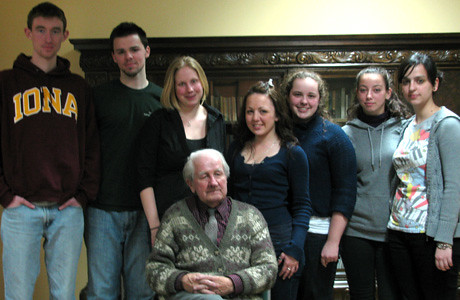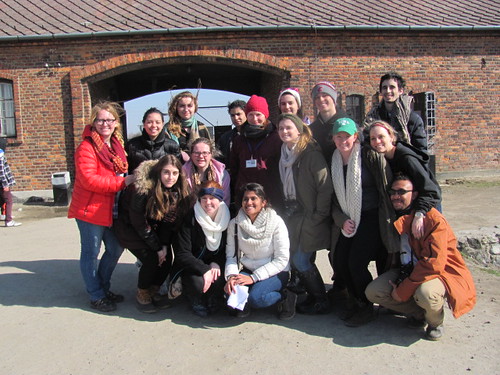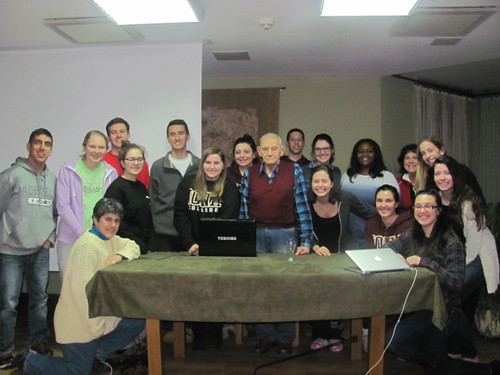As if yesterday wasn’t
difficult, today wouldn’t be easier, or would it be? I hoped it would, but how
could it? Today we were going to Auschwitz-Birkenau.
The bus pulled up to the
camp and we unloaded in front of the main entrance. When Anna, our tour guide,
gathered with our group we began walking away from the camp down a muddy path
towards railroad tracks that had the remaining cattle cars.
They were wooden, a tiny
barred window in the top right side of the car, they were small and about 60-70
people were jammed inside. Innocent people died in the cars, they were
suffocated; babies, children, mothers, men, elders. I don’t understand.
I tended to stay in the
back of the group, not because I wanted to wait to take a perfect picture or
get a good angle with my video camera, but because I needed to be alone. I needed
the gap from the group. Anna would gather us to talk and I stood silent in the
back; lips trembling, legs shaking, eyes watering, not because it was chilly
and slightly windy but because my heart was breaking.
So we walked through the
gates of Auschwitz-Birkenau. The large arch beneath the Nazi’s watchtower, the
railroad track that split off in three different directions, the barracks, the
rubble from destroyed buildings and gas chambers, it was all there.
It was real. This was
real. I was actually witnessing history with my own two eyes. The barracks
where prisoners slept, the cracks in the floor and on the bottom of the walls
where snow came in during the winter, where rodents found there way inside and
called it their home too. I don’t understand.
I walked into another
barrack. A piece of cement about three feet off the ground with holes in it,
the latrines, toilets. 4-6 people to a toilet at a time, and you could only use
it twice a day. A cold, skinny, boney, bottom sitting on cement to relieve
yourself. I don’t understand.
Block #25, the death
block where prisoners were selected and kept to wait inside before sent to the
gas chambers. The cries from inside these walls that were heard from the other
barracks were haunting. I heard them too.
It was dark inside the
barrack. The beds were made of wooden planks that wrapped around the inside
walls. There were three levels; the top, the middle, and the ground. The strongest
prisoners slept at the top, the weakest on the bottom. The windows were barred
shut, there was no escape. I don’t understand.
Another barrack was the
washroom. A long narrow sink that extended to either end of the barrack in the
middle with a sink on two sides. With a washroom so small for so many people,
how could anyone actually feel clean after leaving? With an infestation of
head lice in the camps, could a washroom really help? I don’t understand.
We walked further down
into the depths of the camp. Anna stopped our group by a picture with some
words to talk about it. I felt my mind drifting away and starring at the middle
railway track. The track where prisoners were separated from loved ones and
sorted into workers or sent to the gas chambers.
My eyes kept staring, my
mind kept thinking. I walked away from my group and onto the track. My heart
was pounding with each step I took getting closer, but I had to. I had to
experience what it felt like to be on the tracks. I bent down and knelt, but it
wasn’t enough. My right hand extended out to touch the cold metal track. The
track that the cattle cars unloaded millions of prisoners from, I was touching
it with my own living flesh. This is where my heart broke.
As my eyes fell several
tears and my left arm clenched at my chest, I slowly picked up my head and in
the distance saw the Nazi watchtower and the long railway tracks extending
towards the outside of the camp. With a lump in my throat, I wiped my face and
stood up to join back with my group.
There was a memorial area
where one of the gas chambers was destroyed. People left flowers around the
memorial, it seemed peaceful in this area.
As I walked around there
was another gas chamber that was destroyed. There were steps before it and my
group sat down. There was something special about this area of the camp. My
classmates got emotional and hid their faces. Instead, I stood up and walked
down the stairs towards the barbwire fence.
The air was misty and
tall narrow green trees were in the distance. In this moment my mind shifted
from listening to the questions and comments in my head, to the nature that
surrounded me. I was so consumed with the thoughts in my head that I forgot to
listen. But here in the back of the camp, I felt like I could listen again.
It was the sound of the
birds. Think of waking up early in the mornings of April to the birds chirping
outside your window, that’s what I heard. It was beautiful. It was hope. This
is exactly what I needed to hear, it was closure. It warmed my broken heart and
it no longer felt heavy to walk the rest of the camp. I cried as I looked
between the barbed wire fences to see the birds flying high in the trees. It
made me smile for the first time today. That was God.
The remainder of the day
spent walking the camps was full of jotting down notes, taking pictures,
listening to Anna, and creating memories with my group of classmates. After
leaving the camp today I felt light, hopeful, at peace, comforted, and more
positive. However, the one question and statement that still is unclear to me:
How? –I don’t understand.
How could something like
this actually happen? How was any of this allowed to happen? How could someone
think this was all acceptable? Even though I have been studying this history, and I
knew all of the ‘technical’ answers and understood, I just couldn’t help but
still not understand, if that makes sense. I mean, none of this actually makes
sense, does it? More questions, that’s enough for today.
















































